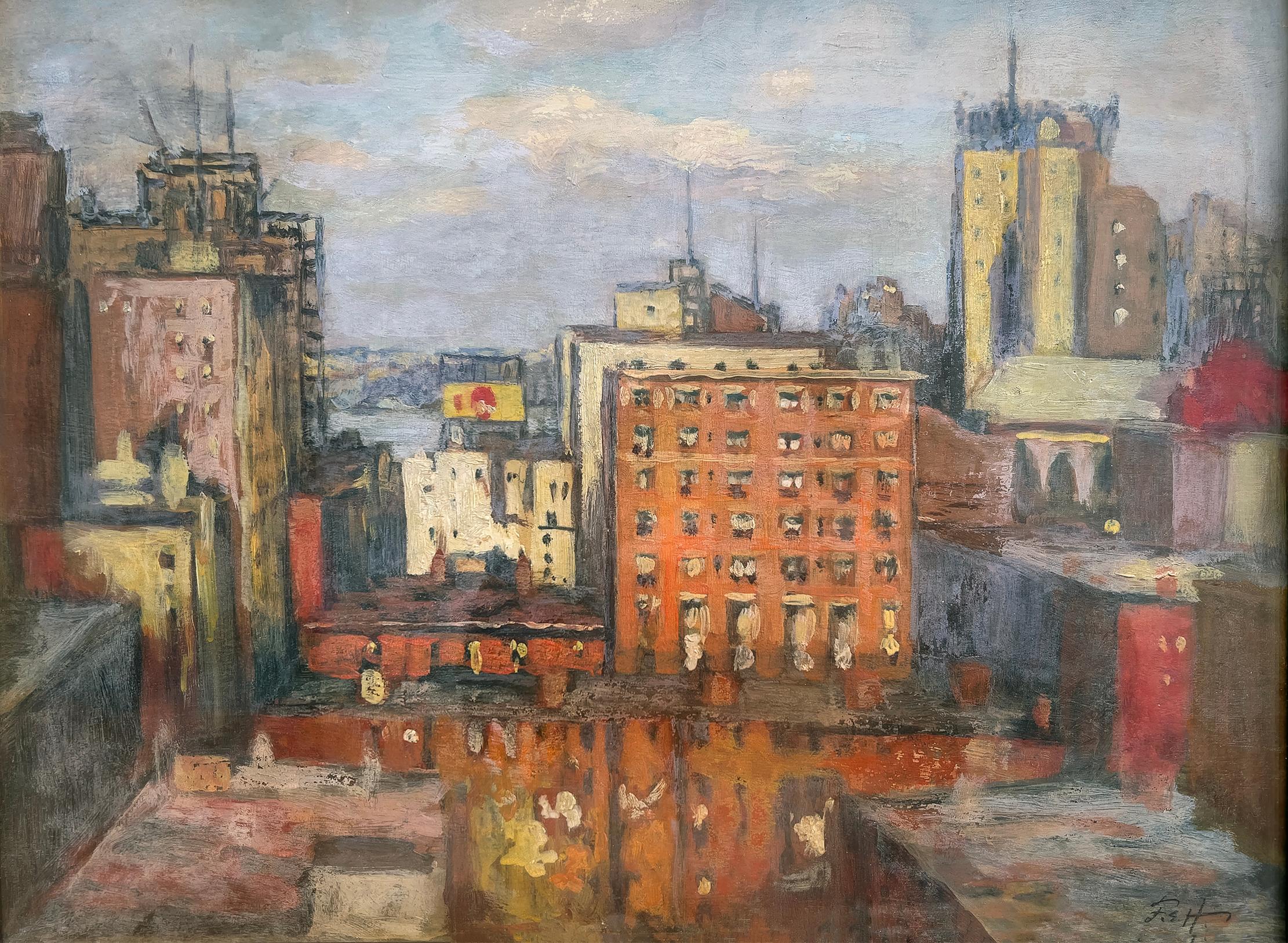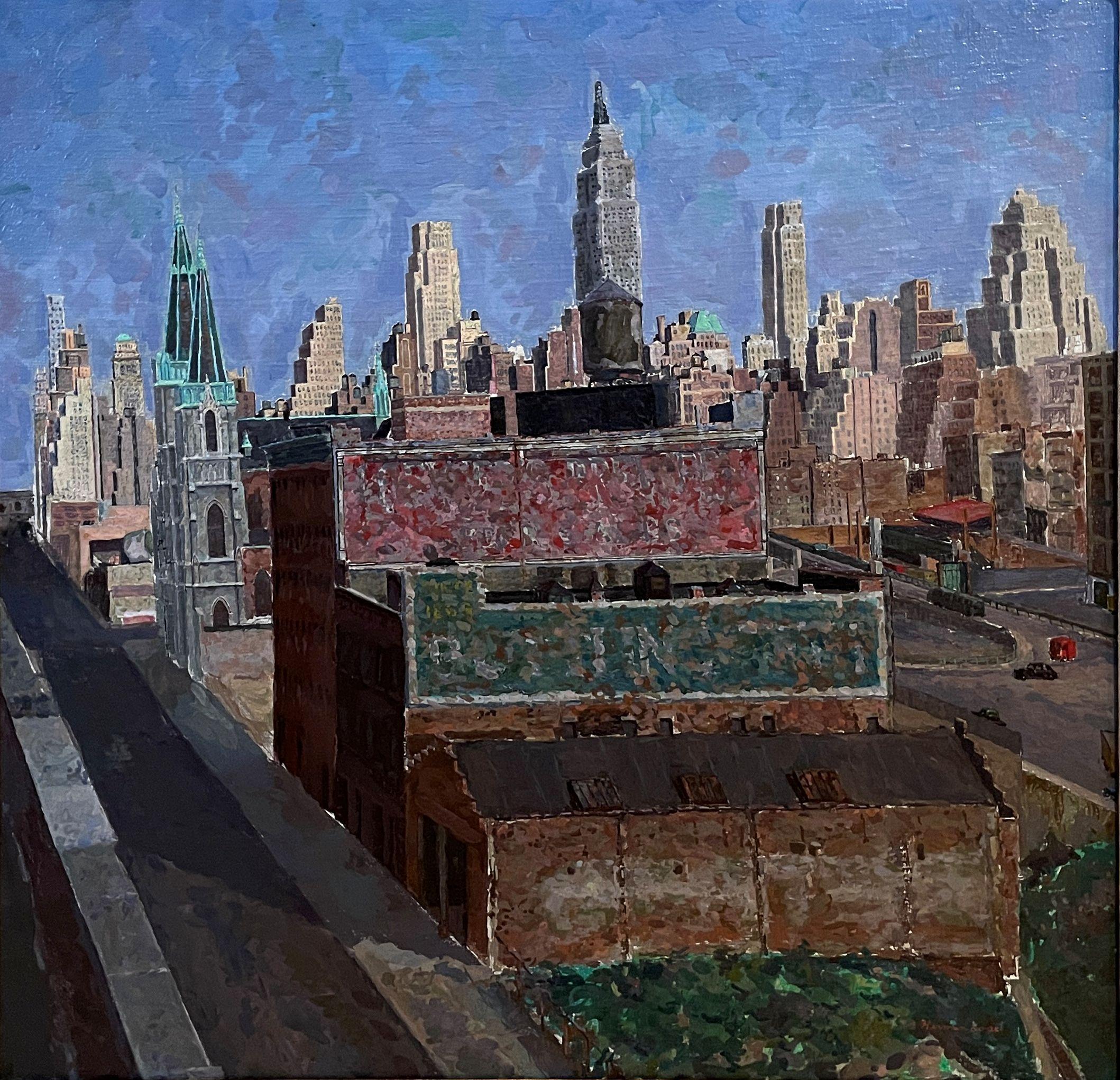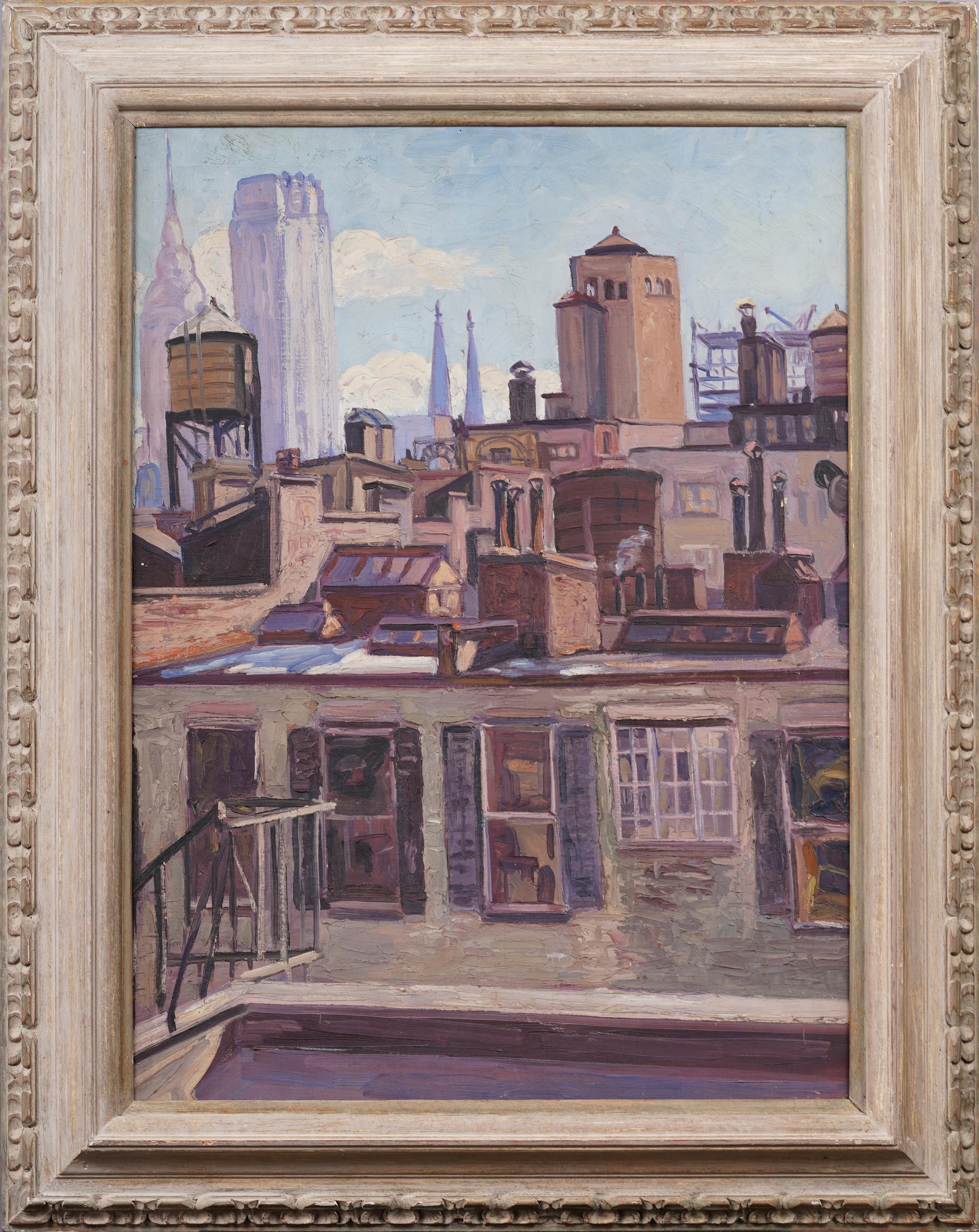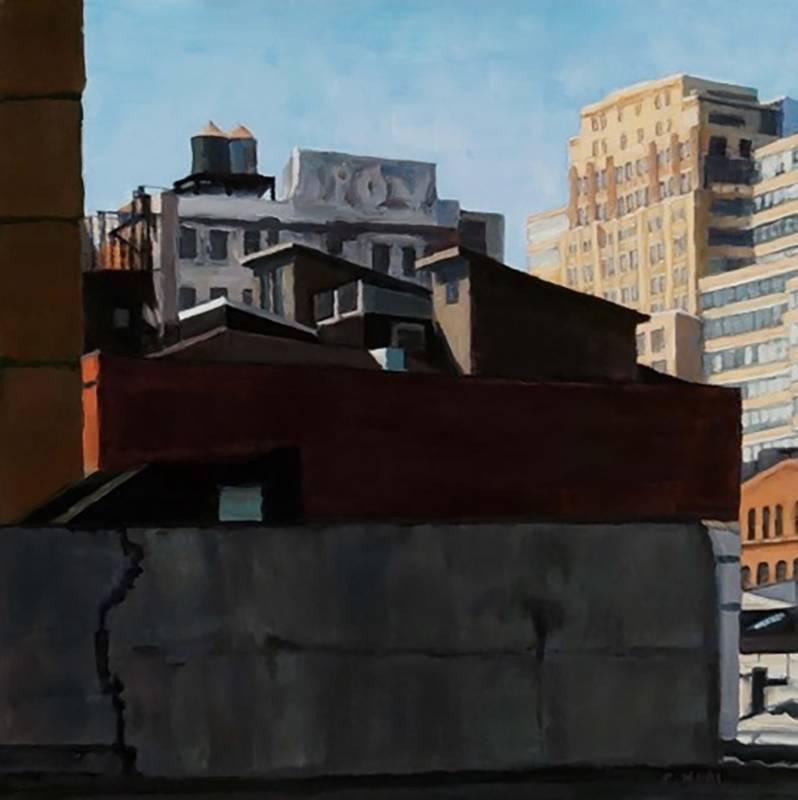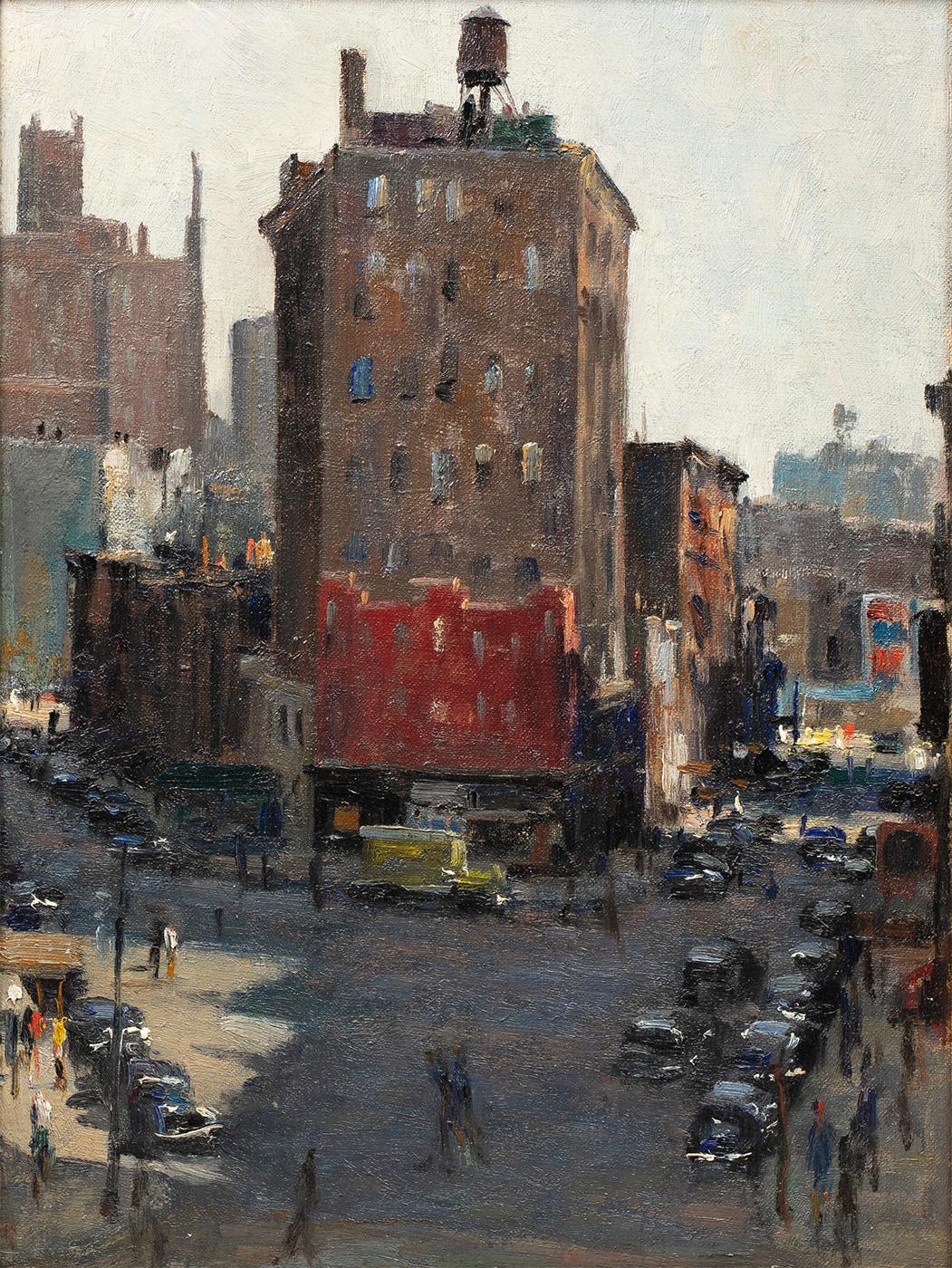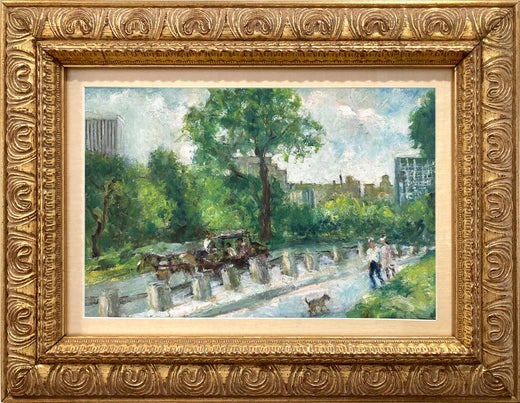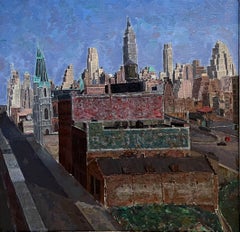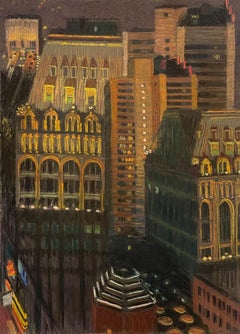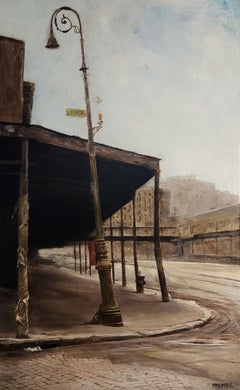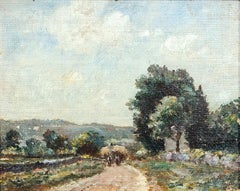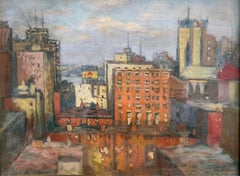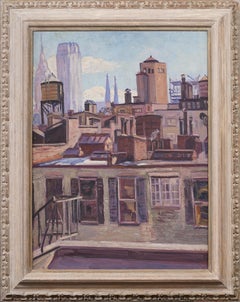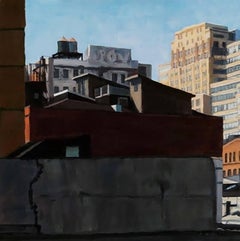Items Similar to "Manhattan from the Rooftops" Nathan Hoffman, Impressionist Cityscape Landscape
Want more images or videos?
Request additional images or videos from the seller
1 of 12
Nathan Hoffman"Manhattan from the Rooftops" Nathan Hoffman, Impressionist Cityscape Landscape1947
1947
$5,000
£3,793.30
€4,349.24
CA$7,122.80
A$7,729.99
CHF 4,067.19
MX$93,919.57
NOK 50,920.43
SEK 47,946.22
DKK 32,473.85
About the Item
Nathan Hoffman
Manhattan from the Rooftops, July 1, 1947
Signed, dated and estate stamped on the reverse
Oil on board
15 3/4 x 20 inches
Born in Russia, the son of Friede (1878 – 1956) and Benjamin Hoffman (1878 – a. 1942). Benjamin was a dealer in mineral and seltzer water and the family resided on Snediker Avenue in Brooklyn, New York, just down the streetfrom the home where George Gershwin (1898 – 1937) was born.
This area of Brooklyn, known as Brownsville, “witnessed the development of one of the largest communities of Eastern European Jewish immigrants during the last decade of the 19th century and the first two decades of the 20 th century.” Today, little remains of this once thriving Jewish section of Brooklyn, which today houses many commercial and repair businesses.
Hoffman studied at the Art Students League of New York, the National Academy of Design and in the art program at Cooper Union. His work at the National Academy received praise, and in 1921 he was awarded the 2nd prize and an honorable mention from the John Armstrong Chaloner Paris Prize Foundation at the National Academy, which allowed the recipient to study in Paris, France for as long as five years. The following year he was awarded the 1 st prize in the competition (with The Reform Advocate running the headline “Young Jew Wins Art Prize”) as well as the Suydam Bronze Medal for his achievements in the Academy’s Men’s Night Class. In 1923 he was residing in Long Branch, New Jersey, when he was awarded 4th place in the Chaloner competition.
Early on, Hoffman exhibited his work throughout the city, including in 1925 with the recently organized Society of Independent Artists. He also received several solo exhibitions during the first part of his career, including one at Ferargil Galleries in 1929. In the spring of 1930 a solo exhibition of his portraits, including paintings and drawings, was held at at Babcock Galleries, where a reviewer noted: “Portraiture is obviously Mr. Hoffman’s specialty… his best work is characterized by a sensitive appreciation of character set down in a vigorous decisive statement.
Later that same year, in August, he participated in Babcock’s summer exhibition where reviewer Jerome Klein, writing for The Baltimore Sun, felt Hoffman’s and other artists work was already becoming old fashioned, remarking “…if an effort toward accomplishment is to be made, it must be in the language of today. It is for that reason that such contemporaries as Eugene Higgins and Nathan Hoffman, in this show, seem artists of a bygone era…” The onset of the Great Depression appears to have slowed his success, as was the case for many up-and-coming artists.
By 1939 Hoffman had become a gallerist in addition to being a painter, operating the collective exhibition space “Sutton Gallery,” which was originally located at 358 East 57th Street. There Hoffman exhibited his own works as well as those created by other prominent New York artists including David Burliuk (1882 – 1967), Charles C. Curran (1861 – 1942), Louis Eilshemius (1864 – 1941), Ann Goldthwaite (1869 – 1944), Maurice Kish (1895 – 1987), Lawrence Lebduska (1894 – 1966), Bradford Perin and Ellis Wilson (1899 – 1977), among others.
Hoffman continued to exhibit his and other artist’s works at the gallery through at least 1963, by which time it had moved to 236 East 60th Street. That year he held a spring exhibition which was dominated by early 20 th century artists, including Charles W. Hawthorne (1872 – 1930) and Joseph Stella (1877 – 1946). Among the works he personally exhibited in the show was a portrait he painted of National Academician, Alphaeus P. Cole (1876 – 1988). Even with his own retail space, Hoffman continued to exhibit elsewhere in the city, including at The Jewish Club and at the Washington Square Artist’s Fair.
Nathan Hoffman died in Flushing, Queens, New York on Sunday, the 20 th of May 1979 at the age of seventy-nine years. At present it is not known where his service was held, however he was interred at New Montefiore Cemetery in West Babylon, New York. An alternate birth date of April 23, 1900 was noted on his World War I registration card, however nearly all other documents record as his birth occurring in February, indicating the April date is likely an error.
Most of what is known about Hoffman is through the several groupings of figurative, landscape and seascape paintings that have appeared on the market over the years. He seems to have been particularly interested in painting in Brooklyn at Brighton Beach, Coney Island and elsewhere in the environs of New York City. Many of these works are small in size, indicating many of them were painted en-plein-air. His earlier works are impressionist in style, though during his later years some abstractions do appear. Hoffman signs his name fully on his paintings as “Nathan Hoffman” and they are often signed and fully dated on the verso as well.
Though there are undoubtedly other exhibitions in which Hoffman participated, those presently known include the following: Society of Independent Artists, New York, NY, 1925; Ferargil Galleries, New York, NY, 1929 (solo); Babcock Galleries, New York, NY, 1930 (twice, spring solo & summer group exhibition); National Academy of Design, New York, NY, 1931; Allied Art Festival Exhibition, Spring Lake, NJ, 1935; Sutton Gallery, New York, NY, 1939 – 63 (solos & group shows); Podell Art Exhibition, New York, NY, 1939; The Jewish Club, New York, NY, 1945? (solo); Kettler Group Exhibition, New York, NY, 1953; Washington Square Artists Fair, New York, NY, (u.d.).
Hoffman’s works are not presently known to be in the collection of any public institutions, however his works reside in many private collections throughout the United States.
- Creator:Nathan Hoffman (1900 - 1979, American)
- Creation Year:1947
- Dimensions:Height: 22 in (55.88 cm)Width: 26 in (66.04 cm)
- Medium:
- Movement & Style:
- Period:
- Condition:
- Gallery Location:New York, NY
- Reference Number:1stDibs: LU1841212878062
Nathan Hoffman “Nathaniel Hoffman” was born on February 15, 1900. He studied at the Art Students League of New York, the National Academy of Design, and in the art program at Cooper Union. His work at the National Academy received praise, and in 1921 he was awarded the 2nd prize and an honorable mention from the John Armstrong Chaloner Paris Prize Foundation at the National Academy, which allowed the recipient to study in Paris, France for as long as five years. In 1923 he was residing in Long Branch, New Jersey, when he was awarded 4th place in the Chaloner competition. Early on, Hoffman exhibited his work throughout New York City, including in 1925 with the Society of Independent Artists. He also participated in several solo exhibitions during the first part of his career, including one at Ferargil Galleries in 1929. In the spring of 1930 a solo exhibition of his portraits, including paintings and drawings, was held at Babcock Galleries, where a reviewer noted: “Portraiture is obviously Mr. Hoffman’s specialty… his best work is characterized by a sensitive appreciation of character set down in a vigorous decisive statement". Later that same year, in August, he participated in Babcock’s summer exhibition. By 1939 Hoffman had become a gallerist in addition to being a painter, operating the collective exhibition space “Sutton Gallery,” which was originally located at 358 East 57th Street where Hoffman exhibited his works next to other prominent New York artists including David Burliuk among others. Hoffman continued to exhibit his and other artist’s works at the gallery through at least 1963, by which time it had moved to 236 East 60th Street. That year he held a spring exhibition dominated by early 20th century artists, including Charles W. Hawthorne and Joseph Stella. Most of what is known about Hoffman is through the several groupings of figurative, landscape, and seascape paintings that have appeared on the market over the years, showing a particular interest in painting in Brooklyn at Brighton Beach, Coney Island and elsewhere in the environs of New York City. Many of his works are small in size, indicating many of them were painted En plein air. Although his earlier works are impressionist in style, during his later years some abstract works do appear. Hoffman’s works are not presently known to be in the collection of any public institutions, however, his works reside in many private collections throughout the United States. Nathan Hoffman died in Flushing, Queens, New York on Sunday, the 20th of May 1979 at the age of seventy-nine years.
About the Seller
5.0
Platinum Seller
Premium sellers with a 4.7+ rating and 24-hour response times
Established in 2022
1stDibs seller since 2022
123 sales on 1stDibs
Typical response time: <1 hour
- ShippingRetrieving quote...Shipping from: New York, NY
- Return Policy
Authenticity Guarantee
In the unlikely event there’s an issue with an item’s authenticity, contact us within 1 year for a full refund. DetailsMoney-Back Guarantee
If your item is not as described, is damaged in transit, or does not arrive, contact us within 7 days for a full refund. Details24-Hour Cancellation
You have a 24-hour grace period in which to reconsider your purchase, with no questions asked.Vetted Professional Sellers
Our world-class sellers must adhere to strict standards for service and quality, maintaining the integrity of our listings.Price-Match Guarantee
If you find that a seller listed the same item for a lower price elsewhere, we’ll match it.Trusted Global Delivery
Our best-in-class carrier network provides specialized shipping options worldwide, including custom delivery.More From This Seller
View All"Manhattan Looking East, " Herman Rose, WPA New York City View from Midtown
By Herman Rose
Located in New York, NY
Herman Rose (1909 - 2007)
Manhattan Looking East (View from Midtown), 1952-54
Oil on canvas
26 x 28 inches
Signed lower right
Fairfield Porter wrote an essay in ArtNews on this exact painting in 1955. Please inquire for a copy of the article.
Literature:
Fairfield Porter, "Herman Rose Paints a Picture," ArtNews, April 1955 Volume 54, Number 2, illustrated.
Herman Rose was best known for his depictions of cityscapes of New York City. Herman Rappaport was born in Brooklyn, New York. in 1909. Herman Rose was the professional pseudonym of Herman Rappaport. Originally trained as a draftsman and studied at the National Academy of Design from 1927 to 1929, he was later employed by the Works Progress Administration's Murals Division under Arshile Gorky from 1934 until 1939. In 1939, after experimenting with a variety of contemporary expressionistic styles, Rose decided to paint from life. Working mostly in East New York and East Canarsie in Brooklyn, and in Manhattan, Rose began to paint roof tops and street scenes.
Rappaport began using the name Herman Rose when he held his first solo art exhibition in 1946 at the Charles Egan Gallery in New York City. Although he initially began as an Expressionistic painter, he became known for small, light-filled Impressionist paintings of still life, cityscapes and skies by the early 1950s. His paintings and images were often composed of very small dabs of paint and tiny, blurry "squares," which combined to create the image on canvas, his favorite medium. Often described as a "lyrical painter" Rose's work "interpreted traditional subjects: landscape, still life and the figure like the Post-Impressionists from whom he developed his own style, Rose built up forms from distinct touches of color that don't entirely blend in the viewer's eye. This gives his surfaces an active quality that flattens forms, one of the great lessons of modernism."
Herman Rose's work received official recognition when Ms. Dorothy Miller of Museum of Modern Art (MoMA) included his work in an exhibition called, "15 Americans," alongside work by Clyfford Still, Mark Rothko and Jackson Pollock.
New York Times art critic Hilton Kramer wrote of Rose's work in 1981, "{he} must surely be counted among the most beautiful works anyone has produced in this challenging medium for many years." The Art in America art critic Lawrence Campbell...
Category
1950s American Modern Landscape Paintings
Materials
Canvas, Oil
"From World Trade Center: Mixed Heights", Yvonne Jacquette, New York City Scene
By Yvonne Jacquette
Located in New York, NY
Yvonne Jacquette
From World Trade Center: Mixed Heights, 1997-98
Pastel on paper
30 x 22 inches
Yvonne Jacquette was born on December 15, 1934 in Pittsburgh, Pennsylvania and grew ...
Category
1990s Modern Landscape Paintings
Materials
Paper, Pastel
"10th Avenue, Meatpacking District" Harry McCormick, New York City Urban Scene
By Harry McCormick
Located in New York, NY
Harry McCormick
10th Avenue, Meatpacking District, New York
Signed lower right
Oil on masonite
23 7/8 x 15 inches
Renowned for his exquisite depiction of light and shadow, Harry Mc...
Category
1970s Contemporary Landscape Paintings
Materials
Masonite, Oil
"Brooklyn, New York" Frederick James Boston, Impressionist Brooklyn Landscape
By Frederick James Boston
Located in New York, NY
Frederick James Boston
Brooklyn, New York
Inscribed verso
Oil on board
7 1/2 x 9 1/2 inches
Though understudied today, Frederick James Boston was a well-known and respected teacher...
Category
Late 19th Century American Impressionist Figurative Paintings
Materials
Board, Oil
"New York City Skyline View from the East River, " Lionel Reiss, Jewish Artist
By Lionel Reiss
Located in New York, NY
Lionel S. Reiss (1894 - 1988)
New York City Skyline View from the East River
Watercolor on paper
13 x 19 inches
Signed lower left
In describing his own style, Lionel Reiss wrote, “By nature, inclination, and training, I have long since recognized the fact that...I belong to the category of those who can only gladly affirm the reality of the world I live in.” Reiss’s subject matter was wide-ranging, including gritty New York scenes, landscapes of bucolic Bucks County, Pennsylvania, and seascapes around Gloucester, Massachusetts. However, it was as a painter of Jewish life—both in Israel and in Europe before World War II—that Reiss excelled. I.B. Singer, the Nobel Prize winner for Literature, noted that Reiss was “essentially an artist of the nineteenth century, and because of this he had the power and the courage to tell visually the story of a people.”
Although Reiss was born in Jaroslaw, Poland, his family immigrated to the United States in 1898 when he was four years old. Reiss's family settled on New York City’s Lower East Side and he lived in the city for most of his life. Reiss attended the Art Students League and then worked as a commercial artist for newspapers and publishers. As art director for Metro-Goldwyn-Mayer, he supposedly created the studio’s famous lion logo.
After World War I, Reiss became fascinated with Jewish life in the ‘Old World.’ In 1921 he left his advertising work and spent the next ten years traveling in Europe, the Middle East, and North Africa. Like noted Jewish photographers Alter Kacyzne and Roman Vishniac, Reiss depicted Jewish life in Poland prior to World War II. He later wrote, “My trip encompassed three main objectives: to make ethnic studies of Jewish types wherever I traveled; to paint and draw Jewish life, as I saw it and felt it, in all aspects; and to round out my work in Israel.”
In Europe, Reiss recorded quotidian scenes in a variety of media and different settings such as Paris, Amsterdam, the Venice ghetto, the Jewish cemetery in Prague, and an array of shops, synagogues, streets, and marketplaces in the Jewish quarters of Warsaw, Lodz, Krakow, Lublin, Vilna, Ternopil, and Kovno. He paid great attention to details of dress, hair, and facial features, and his work became noted for its descriptive quality.
A selection of Reiss’s portraits appeared in 1938 in his book My Models Were Jews. In this book, published on the eve of the Holocaust, Reiss argued that there was “no such thing as a ‘Jewish race’.” Instead, he claimed that the Jewish people were a cultural group with a great deal of diversity within and between Jewish communities around the world. Franz Boas...
Category
1940s American Modern Landscape Drawings and Watercolors
Materials
Paper, Watercolor
$2,800 Sale Price
20% Off
"Municipal Building, Manhattan, New York, " Ruth Anderson, Impressionist Scene
Located in New York, NY
Ruth Anderson
Municipal Building, Manhattan, circa 1918
Oil on canvas
25 x 19 inches
Ruth A. Anderson was born in Carlisle, Pennsylvania in 1891 and die...
Category
1910s Impressionist Figurative Paintings
Materials
Canvas, Oil
You May Also Like
New York Skyline the West Side with Hudson River - Vintage New York
By Frank S. Hermann
Located in Miami, FL
Rooftop view of the upper West Side Manhattan as it looked in the 1930s. There is a rough indication of a billboard and a glimpse of the Hudson River. The cluster of buildings depic...
Category
1930s American Impressionist Landscape Paintings
Materials
Oil, Gouache, Board
View of New York - Post Impressionist Oil, Cityscape by Jacques Martin-Ferrieres
By Jacques Martin-Ferrières
Located in Marlow, Buckinghamshire
A stunning oil on canvas urban landscape by sought after French post-impressionist painter Jacques Martin-Ferrieres. The piece depicts a very rare view of the Manhattan skyline - pai...
Category
1940s Post-Impressionist Landscape Paintings
Materials
Canvas, Oil
Antique American Impressionist New York Cityscape Framed Large Oil Painting
By Allen Tucker
Located in Buffalo, NY
Impressive early American impressionist cityscape oil painting attributed to Allen Tucker (1866 - 1939). Framed. Oil on canvas. Unsigned. Image size, 30H by 22L.
Category
1960s Abstract Landscape Paintings
Materials
Canvas, Oil
$5,400 Sale Price
20% Off
City Side (Modern Cityscape Oil Painting of Brooklyn Rooftops)
By Patty Neal
Located in Hudson, NY
oil paint on panel
12 x 12 inches
This contemporary cityscape oil painting is painted on wood panel in a realistic style. The scene is of a Brooklyn skyline where old water towers...
Category
2010s Modern Landscape Paintings
Materials
Oil, Wood Panel
New York City View
Located in New York, NY
On verso: NY City View / ARTIST: MIRA
Category
20th Century American Modern Landscape Paintings
Materials
Oil
Empire State Building View from Above- original modern NY cityscape oil painting
Located in London, Chelsea
This exceptional artwork is currently on display and available for sale at Signet Contemporary Art Gallery and online. Empire State Building View from Above the Highline places one o...
Category
21st Century and Contemporary Abstract Landscape Paintings
Materials
Canvas, Oil
More Ways To Browse
Hawthorne Vintage
Manhattan Oil Painting
American Impressionist Cityscapes
Hoffman Oil
Hoffman Oil Painting
Seltzer Water Vintage
Nathan Hoffman
Charles C Curran
Ellis Wilson
1944 Oil
Byam Shaw
Forest Hills
Keith Oil Painting
Vintage Farm Scenes
Yorkshire Landscapes
Antique Maritime Paintings
Architecture San Francisco
California Impressionism
